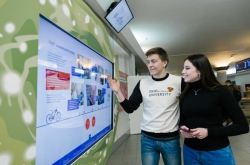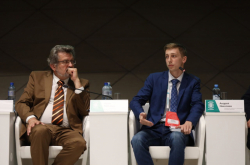Who is this program suited for and what are its goals?
Our new program should interest people who want to redevelop our economic industry and society in a new way, who want to know about the new technological trends in the global economy and facilitate their adoption and development in Russian industry. The main goal of our program is to make up for the deficit of experts in real economy. It aims to train those who will design and introduce technological innovations into the operating procedures of ongoing enterprises. We’re talking about innovations that have already been invented, are known and available, but have not yet been introduced into the actual working processes. Our future graduates will identify the problematic parts of the operating procedure and assist enterprises in choosing the right technology to be purchased and integrated into the procedure to achieve a positive effect.
What makes this program unique?
The program is very variable. Any Bachelor’s program has a number of elective courses, which tend to come in pairs. Students pick one out of the two, thus deciding on their program track. In the case of our program, an elective module contains five courses. There are a total of 17 courses, and they are all structured in a way that allows students to take all 17 courses in a program track and receive a complex professional education not just as someone who can introduce technological innovations, but as a specialist possessing basic technical knowledge in a certain area. We offer five program tracks: Strategic Management of Innovative Businesses, Organization of Innovative Production, Innovative Technologies in Finance, Innovation Marketing, Transport Innovations. If the program track the student chooses is not to his liking, they can choose a different one in the next semester. There is no strong attachment to a track, but we do recommend that students choose a definite track if they want to develop complex and systematic knowledge in a certain field, as there are very few experts like that on the job market right now and they’re all in high demand.
 Elena Budrina
Elena Budrina
When do students start choosing their courses?
They can choose courses starting from their first year. In the first semester they’ll have two elective courses and two more in their second. These courses will introduce them to the basics of their trade. From then on, the courses will become more advanced and their number will increase. In the third and fourth year their number will be the highest.
What kinds of testing can applicants expect when applying?
The entrance exam requirements for our program include Russian and English languages and mathematics. A bit unusual for a tech degree, but we’ve decided to opt for a foreign language. There’s a reason for that: technological innovations are often results of international projects and the descriptions and technical documentation tend to be in English. Even technologies made in Russia are soon translated into other languages, and, of course, English is usually the first choice. It’s crucial that our students have a good grasp of the English language. In addition, the international activity our university takes part in (various events, lectures, internships, summer and winter schools) require a proper knowledge of English.
For those applicants who for whatever reason have not been able to take the Unified State Exam, university will offer entrance exams, but they’ll need to be wary of the time limits for supplying their paperwork: to take the university’s entrance exams, you need to submit all required documentation before July 10. Those who took the USE can simply apply with the admissions committee.
How much interest do you expect to see for this program?
We have very few Bachelor’s programs in innovation studies that would train these kinds of experts. In Russia, most programs on innovation studies provide only basic training. They tell students what an innovation is, how it’s made, how it’s promoted and how it’s marketed. We have made our program more focused on training experts for the real sector. This doesn’t mean that those who show a talent and interest in, for example, research or creative work can’t go and work in a different field, but our aim is, first and foremost, to prepare experts for the real sector of economy. That is why we’re expecting applicants to show interest in our program.
What courses and research topics can your future students expect?

Our research topics can be very varied, but they all, of course, will deal with technology and management of technological innovations. We’re not training managers with knowledge of engineering, but engineers with knowledge of management – which is something that a lot of students lack when they first come to study engineering. For that reason, training in technological innovation planning will be a part of the basic course that will last for two years. Students will work on a large, long-term project for four semesters and prepare a milestone report at the end of each semester. This project will focus on introducing an innovation or managing technological innovations at a given enterprise.
The advantage of this program is that it has a wide variety of uses on the job market. Specialists in this field are useful in all kinds of industries: in transportation, manufacturing, and service – anywhere that involves high-tech and knowledge-intensive production.
How easy is it to transition from one program track to another? After all, the fields studied in each track are quite specific.
If a student is doing that in the course of study, they need to consult with tutors to structure their program in a way that the knowledge they acquired in their former track doesn’t become useless in their new one. The entire curriculum is constructed so that the courses become more extensive and, at the same time, more in-depth. This principle is hardly affected by the tracks the students choose.
Who will teach this program?
We’ll have a mixed team of professors – some are employees of the university and some come from various businesses. The professors employed by ITMO are experts in various fields that form the basic course. The visiting professors come from a business environment; they will teach courses on areas that are more prone to change due to the constant dynamic of the working world. For instance, “Simulation of Innovative Technologies in Transportation” and “Informational Technologies in Transportation” are two of the most coveted courses among students. There are courses in process engineering or intellectual property management which are, too, headed by representatives from related enterprises. We already have agreements in place with heads of certain businesses that will help us conduct courses.

What will practice training be like?
We have three kinds of practice training. Organization-and-management practice is done after the second year with the students being attached to a particular business where they will study and document the operating procedure and identify its basic problems. Purely technological training is done toward the end of the third year and immerses students in the specifics of the operational procedure at a particular enterprise and its interactions with other processes at that workplace. The final pre-graduation training is also done at a facility for which the students will develop their graduation project and assists them in gathering the required material to complete it.
What are the students’ employment prospects at their place of practice training?
We have contracts for them to let us train our students there, but further employment will depend on how well the students demonstrate their abilities during practice training. A business will not only take into consideration the skills a student has acquired in their first year before attending practice training. They will also care about the young specialists’ willingness and capacity to dive deeper into their field of work, about their already existing knowledge and the ability to use it. If a student demonstrates ambition not just in class, they are not likely to have trouble finding employment. We have a Master’s program called “Innovative Transportation Technologies”. The students there have been working together with businesses for a while now, and there are already job positions awaiting them. When they graduate from the program, they find work with our partner companies.
How wide is the variety of continued education programs available for these graduates?
They can pick any Master’s program they find interesting. As for innovation studies, there are several master’s programs that allow students to choose their own in-depth field of study. There are about 10 Master’s degree programs at Faculty of Technological Management and Innovations.

What awaits the alumni after they graduate?
There are not many specialists who don’t come up with innovations, but instead are deeply familiar with their variety and know about all the things that have already been invented and can be applied in production. As of now, there are two groups of people that form the current technological paradigm: those who invent technological innovations and those who promote them, design their integration and integrate them. There are many inventors, but they tend not to have enough knowledge of how to quickly and effectively promote and sell their inventions. Those who promote innovations, however, often lack the knowledge of engineering they need to find the right place for their product. Our program came about as a way to train specialists who would fill in this niche in the job market and the real sector – to give engineers a good understanding of how to promote, plan and integrate their innovations with an economic benefit.
Have businesses already allocated positions for such specialists or can the graduates be their own boss and cooperate with businesses?
Both options are possible. A lot of places now offer job positions for “development specialists” or “innovation specialists”. These are vital to businesses, as they all need to secure a spot on the market and develop themselves. You can’t have a market presence if you don’t continue pursuing innovation. That’s why these specialists are in demand and in short supply. Oftentimes a position is vacant, but a specialist with the right education or skills can’t be found. Graduates can freelance, too. Some open their own business, usually consulting or analytical firms, small businesses, start-ups and projects that grow into something bigger. They can be small engineering companies that develop and market their own innovations. At our university, special environments have been created for this purpose – the business-incubator and the Technopark, where students can try to develop their ideas as start-ups.





